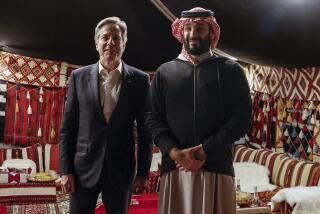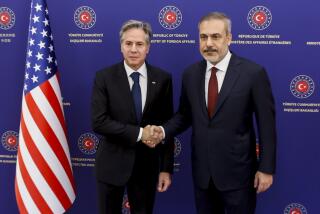Inspectors Get to Work as U.S. Lobbies Allies
- Share via
UNITED NATIONS -- After a four-year absence, international inspectors resumed their search for weapons of mass destruction in Iraq on Wednesday, and a U.N. team leader in the field called the initial cooperation by Iraqi authorities “a good sign.”
But even as the inspections began without incident, the Bush administration shifted its war planning into high gear. A senior administration official said Wednesday that the White House will dispatch a handful of key envoys across the globe over the next few weeks to close deals with potential allies in a possible war with Iraq.
Deputy Defense Secretary Paul D. Wolfowitz leaves Sunday on the first mission in the new campaign to build a war coalition prepared to act if Iraq fails to satisfy the inspectors that it has surrendered its suspected arsenal. Wolfowitz is scheduled to visit NATO headquarters near Brussels, as well as Britain and Turkey. The administration plans additional trips to potential allies in Russia, East Asia, South Asia and Iraq’s neighbors in the Middle East and Persian Gulf.
The high-level diplomatic effort underscores the administration’s determination to be ready to rapidly attack if Iraqi President Saddam Hussein fails to cooperate with the weapons inspectors.
The first day of inspections appeared to go smoothly. The 17 monitors who began their work Wednesday were divided into two groups, with six inspectors concentrating on potential nuclear sites and 11 on possible biological or chemical weapons-related complexes.
In Baghdad, Jacques Baute -- leader of inspectors from the International Atomic Energy Agency, the team in charge of nuclear arms -- said: “We have not sensed anything which obstructed us. We were welcomed in a polite and professional manner, and we were able to do the job.”
Baute’s team spent three hours at Al Tahadi, a scientific research center in northern Baghdad, which Iraqi officials said manufactures motors and has never been part of the nation’s nuclear program.
The other group of inspectors, a convoy of United Nations monitors, visited a military-run graphite plant and an adjacent missile-testing facility at the Al Rafah science research center, 15 miles southwest of Baghdad.
Military guards quickly opened the gate to the compound, and the inspectors disappeared inside. They emerged about five hours later to say only that they had been granted immediate access.
The sites selected Wednesday had been scrutinized during inspections years ago.
“It went according to plans altogether,” chief U.N. inspector Hans Blix said at the world body’s headquarters in New York after receiving reports from staff members conducting the searches. “We are on a firm path forward.”
Promising more inspections “in all shapes and forms,” Blix emphasized the surprise nature of the searches: “We aren’t telling anyone in advance where we are going.”
Early today, four cars carrying inspectors left the monitors’ headquarters in Baghdad to begin a second day of work at an undisclosed location.
The U.N. resolution passed unanimously by the Security Council on Nov. 8 authorizes the inspectors to go anywhere at any time. The resolution includes a series of deadlines, and an important one comes Dec. 8, when Baghdad must declare any weapons of mass destruction. By Jan. 27, the inspectors are required to issue their first report to the Security Council.
In Paris on Wednesday, U.N. Secretary-General Kofi Annan told Europe 1 radio that “the only way to avoid a military conflict” is for Iraq to cooperate with the searches.
He added, “I do not believe war is inevitable.”
The United States, however, is continuing to prepare for war. The diplomatic effort that begins this weekend ratchets up conversations the administration has already initiated with potential allies, officials said.
“This is a natural extension of the process” that began with sending cables to U.S. embassies two weeks ago, asking what help the administration could expect from their host countries, a senior State Department official said Wednesday. That process continued with President Bush’s approaches to European allies at last week’s North Atlantic Treaty Organization summit in the Czech Republic, the official said.
“We know from 12 years of dealing with Saddam Hussein that the best way to avoid armed conflict -- perhaps the only way -- is to keep the pressure up,” the official said.
Turkey is the most important stop on Wolfowitz’s schedule. Pentagon planners believe they need only limited military support from well-trained forces in nations such as Britain but seek as broad a coalition as possible, the senior administration official said.
The new campaign is aimed largely at uncommitted but potentially crucial allies -- such as Turkey -- who could supply basing and overflight rights and at those who could help in peacekeeping and other postwar tasks.
The 15-0 vote in the Security Council requiring Iraq to disarm “was much more than [U.S. officials] hoped for,” said Edward B. Atkeson, a former Army and CIA intelligence official who is now a NATO expert with the Center for Strategic and International Studies, a Washington policy institute. “I imagine they thought, ‘Who else is interested?’ ”
Many nations have already pledged support in the event of war, the administration official said, but some have suggested that they would back an invasion only under the auspices of the United Nations .
Administration officials who are expected to make the journeys include Deputy Secretary of State Richard L. Armitage; Marc Grossman, undersecretary of State for political affairs; Deputy National Security Advisor Stephen Hadley; and Douglas J. Feith, undersecretary of Defense for policy.
Wolfowitz’s visit to Turkey comes when the nation stands at a significant juncture. It is both looking westward, aspiring to join the European Union, and adjusting to the governance of the newly elected Justice and Development Party, which has strong Islamic roots.
Bush administration envoys have in recent months lobbied Turkish President Ahmet Necdet Sezer, the military and others within the secular government’s bureaucracy. They now must make their case with the new government.
That government has promised to maintain close ties to the West but is expected to face intense pressure not to join non-Muslims in a war against Iraq. Turkish officials are particularly concerned that after a war, the Kurdish-dominated northern portion of Iraq would become an independent Kurdistan, possibly fomenting unrest among Turkish Kurds across the border. Previous envoys have assured the Turks that the U.S. opposes an independent Kurdish nation.
During his visit to the Turkish capital, Ankara, Wolfowitz is expected to argue that Turkey would make political, security and economic gains after Hussein was toppled. Turkey, whose new government came to power promising to lift the nation out of its recession, holds a natural advantage in trading with Iraq if U.N. sanctions against Iraq are lifted.
Wolfowitz is also expected to discuss how and when the United States and Turkey can decide on an alliance against Iraq. At the very least, he will be looking to secure U.S. access to Turkish bases at Incirlik and elsewhere. The U.S. and Britain are already using Turkish bases to patrol the “no-fly” zone over northern Iraq.
“We depend very, very heavily on the bases there -- and we’ve got to make sure that they’re with us in this in all respects,” Atkeson said. “We don’t know whether we’ll have Saudi Arabia or not, and you can’t put everything in Kuwait.”
Patrols in the no-fly zones over northern and southern Iraq appeared to have come under increasing fire in recent weeks as the inspections neared.
On Wednesday, an air raid siren sounded several hours after the initial inspections, as a vapor trail from what Iraqi officials called “a hostile flight” was seen over Baghdad.
“It was not a coalition aircraft. It was not a U.N. aircraft,” said Lt. Col. Dave Lapan, a Pentagon spokesman. “It seems strange that a hostile aircraft would fly over Baghdad and they would not shoot at it.”
At times, the first day’s inspections resembled a movie chase as about 100 journalists in cars pursued the monitors, who were in convoys of white U.N. vehicles along with escorts from Iraq’s National Monitoring Directorate.
Two press cars bumped into each other, and at one point a massive traffic jam occurred as police held back ordinary drivers to allow the convoys to proceed.
After the inspections at the graphite site, Dimitri Perricos, the U.N. team leader, said graphite could be used to make pencils as well as missile batteries and the cone of a missile.
In October, the CIA, citing analysis of satellite photos, charged that Iraq was erecting a large test stand for prohibited long-range missiles at the missile-testing facility.
Hussein’s government countered that the structure was designed only for the engines of shorter-range missiles, which are permitted under U.N. arms control resolutions.
Perricos said his team discovered that monitoring equipment previously placed at Al Rafah had been taken away or destroyed. He said the instruments still intact would be collected and examined .
Plans call for about 100 inspectors to be ready to work in Iraq by Christmas. Blix said an additional training course was scheduled in January that could increase to 300 the number of available arms control experts.
The events Wednesday constituted a significant new chapter in what has been a difficult, dangerous and often frustrating effort that began in April 1991 when the Security Council established a special commission to search for and destroy Iraq’s most deadly armaments.
That month, Iraq’s foreign minister sent a letter to U.N. headquarters stating that the country possessed no forbidden nuclear items and no biological weapons. It listed some chemical munitions and a limited arsenal of Scud missiles.
The initial letter quickly proved to be false. But more than 11 years later, the question of the full extent of Iraq’s stockpile remains to be resolved.
*
Farley and Goldman reported from the United Nations and Hendren from Washington. Times staff writer Sonni Efron in Washington contributed to this report.
More to Read
Sign up for Essential California
The most important California stories and recommendations in your inbox every morning.
You may occasionally receive promotional content from the Los Angeles Times.










